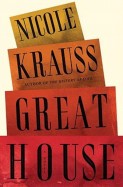
[W. W. Norton & Company; 2010]
by Amanda Shubert
Nicole Krauss’ novel Great House unfolds in luminous stream-of-consciousness by four narrators whose lives are united by a writing desk with a mysterious provenance. As the novel unravels, more and more is revealed about the history of the desk. But the desk raises questions that solutions will not sate; it stands for the mysteries of memory and human consciousness, for loss and time and exile, mysteries that, like the stories the narrators tell, can only be drawn out, never resolved or put to rest. Krauss is a virtuoso craftsman, and each narrative thread unfurls with elegance and suspense, oscillating around the desk and its shifting symbolic meaning.
The desk is also an expression of diaspora and genocide, themes Krauss returns to in her work: it surfaces through seventy years of post-Holocaust history, crossing the map, bearing mute witness to horror for which there can be no consolation. Krauss’ characters, many of them writers, cannot forgive themselves for making art on the graves of the dead; they put writing on trial for its inhumanity, its misappropriation and abuse of reality. Readers as well as writers are subjected to moral scrutiny. The characters are always reading one another’s diaries and unfinished manuscripts, trying to steal that revelatory glimpse of the people they love that will unlock their buried secrets. But the search for answers sends the characters so deep within themselves they are lost to one another – they leave their lovers impatiently on the sidelines while they spring to life in solitary imaginative worlds.
This is a novel you cannot help but remain within long after it is over. Its moral paradoxes are so sharply articulated, its characters so generously drawn, its images so uncanny that the effect of the novel is like that of the hulking figure of the desk that looms over the characters – provocative and vertiginous, horrifying and sublime. “The more I’ve learned in my life, the more acutely I’ve felt my hunger and blindness,” says one narrator, “and at the same time I’ve felt closer to the end of hunger, the end of blindness.” This pursuit of meaning is at the heart of the novel and we are carried in its wake, embroiled alongside the characters in stories and memories in the expectation of revelation.
This post may contain affiliate links.








